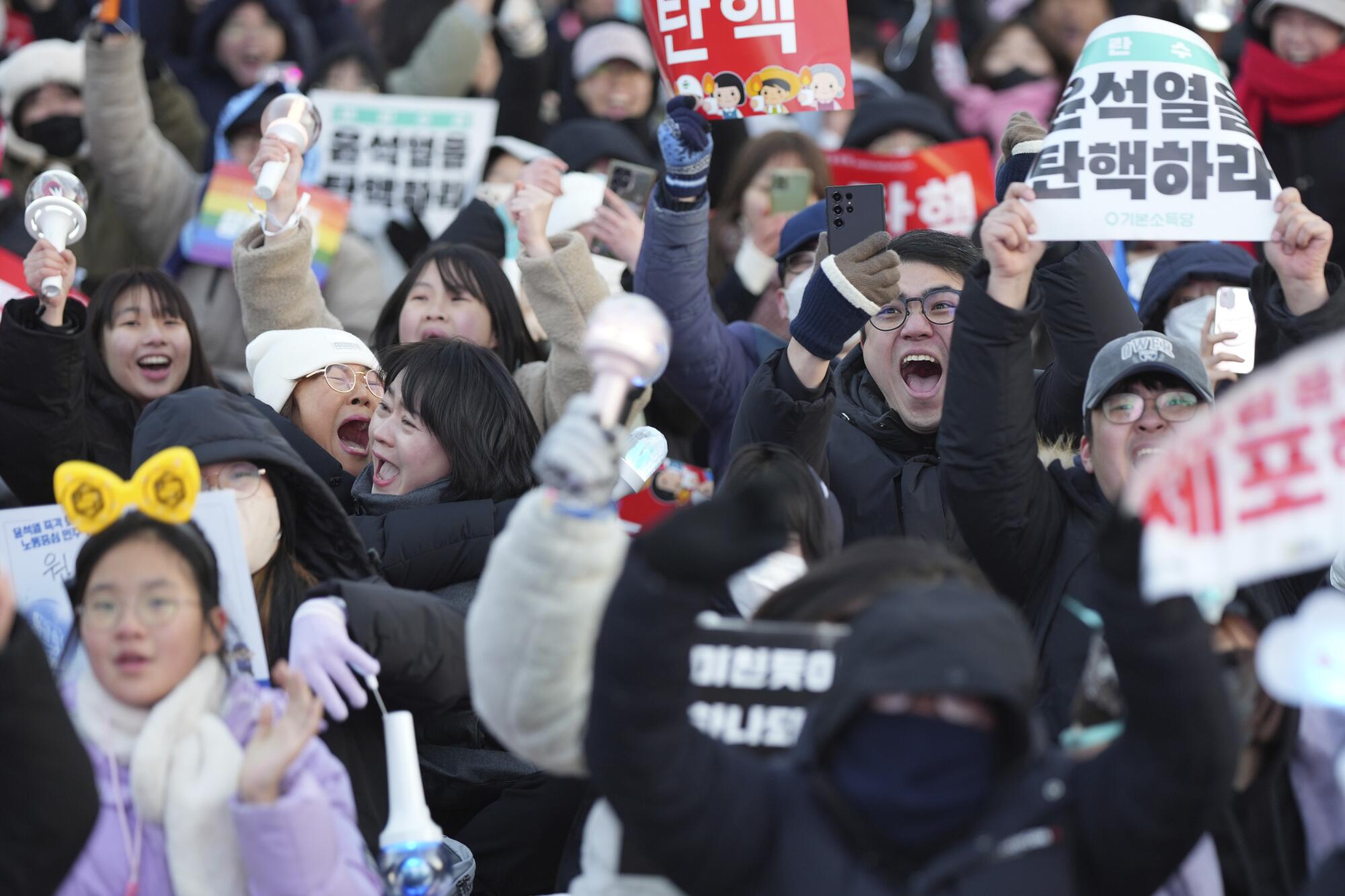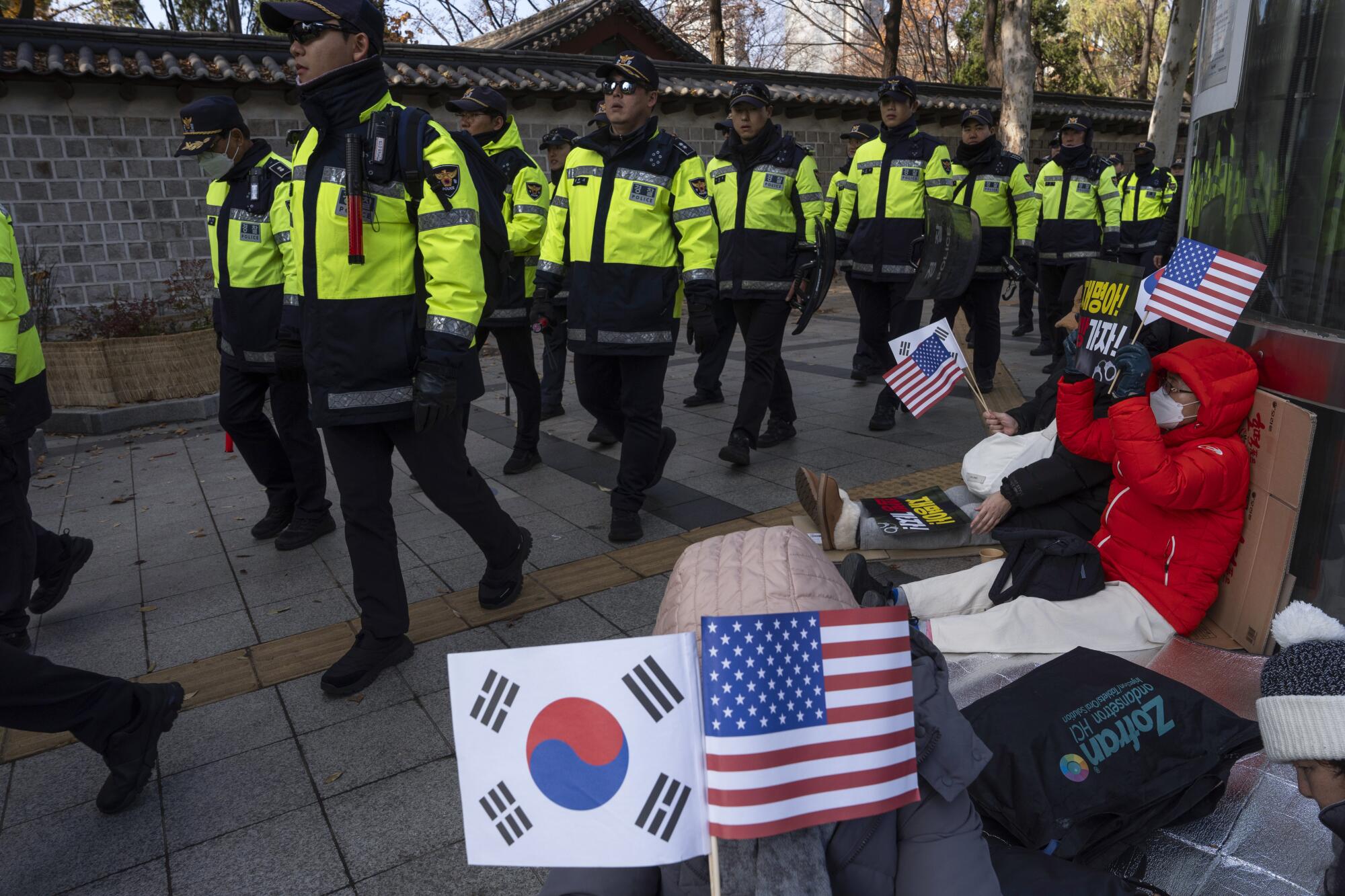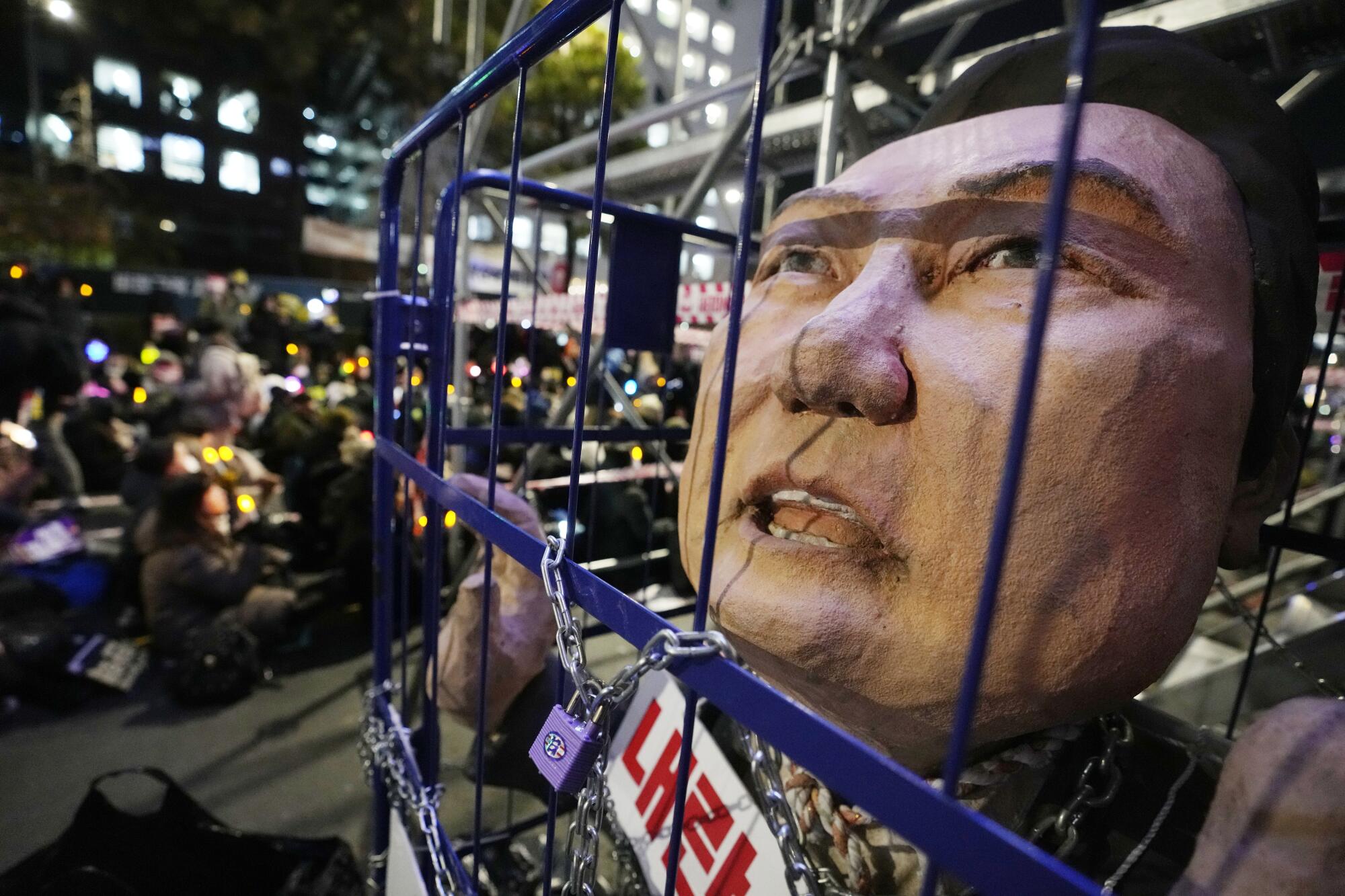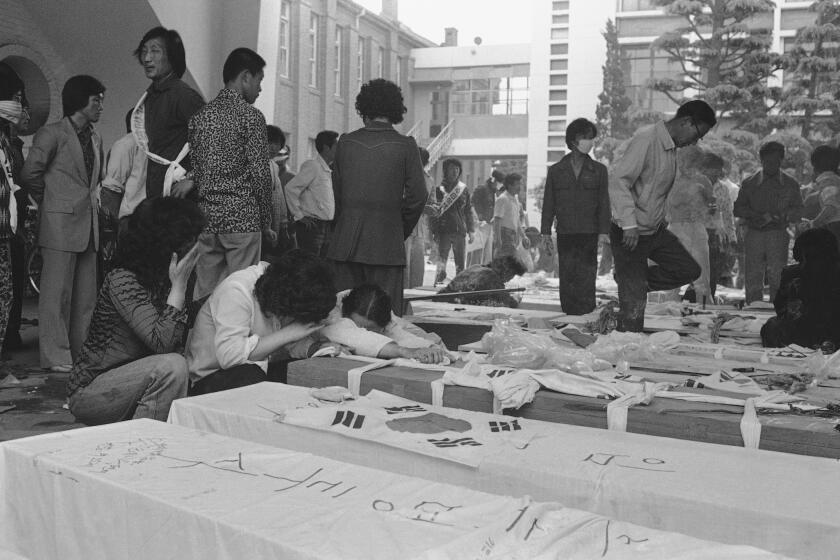
- Share via
SEOUL — South Korean lawmakers voted Saturday to impeach President Yoon Suk Yeol, whose short-lived declaration of martial law this month upended the democratic order and sparked a crescendoing campaign for his ouster.
Yoon’s presidential powers have been formally suspended, and Prime Minister Han Duck-soo now serves as interim president. The country’s Constitutional Court has 180 days to rule whether to uphold the impeachment motion. If so, Yoon will be formally removed, triggering a snap election within 60 days to choose a new president.
Outside the National Assembly, loud cheers washed over a large crowd of pro-impeachment protesters, some of whom had set up free coffee and food stalls for fellow demonstrators. Elsewhere in the city, people were glued to their smartphones and televisions, anxiously watching the surreal political moment.
But the uncertainty is hardly over. In a televised address to the nation shortly after the impeachment vote, Yoon was defiant, saying he had worked “without a moment of rest” for the good of the country.
“I am frustrated at the thought that all of these past efforts will have been in vain,” he said. “I will never give up.”
Yoon, however, has lost the united support of his own party. A dozen members of his conservative People Power Party joined opposition lawmakers to pass the threshold of 200 votes — two-thirds of the legislature — required for his impeachment. The final vote was 204 to 85.

“This is a triumph of democracy and of the South Korean people,” Park Chan-dae, the opposition party floor leader, said after the vote.
Kim Ji-hoon, a 32-year-old actor in Seoul who recently worked as an extra in “12.12: The Day” — a historical drama that tells the story of one of South Korea’s most notorious military coups in the late 1970s — had watched the voting from home, recalling the alarm he had felt after Yoon’s declaration of martial law.
“It struck me how easily our hard-won peace could be taken away from us,” he said.
“We should never forget this moment, which should never be repeated again.”
South Korea’s president has made combating disinformation a centerpiece of his agenda. But free press advocates say his vow to keep reporters honest is a pretext to intimidate his critics
Until now, many of Yoon’s party members had resisted backing the opposition-led push to impeach him, saying they would seek an “orderly resignation” instead.
But recent developments made that position untenable.
Numerous testimonies emerged contradicting Yoon’s claim that his declaration of martial law on Dec. 3 was meant only as a show of force to the opposition-controlled National Assembly — which he described as filled with “anti-state” saboteurs and North Korea sympathizers.
A document leaked to opposition lawmaker Choo Mi-ae from the military’s counterintelligence unit showed that preparations for the declaration had been made at least a month in advance — and that the military had reviewed available medical facilities in seeming anticipation of bloodshed.

A senior officer in the unit also told lawmakers that he was given a list of key politicians to arrest.
Lt. Gen. Kwak Jong-keun, the commander of the special forces unit that stormed the National Assembly, testified this week that Yoon personally ordered him to prevent the gathering of 150 lawmakers — the threshold needed to overturn a martial law declaration.
“Hurry up and break down the door and drag out anyone inside,” Kwak recalled Yoon telling him on the phone.
As South Korea confronts a dark chapter of its history, a former soldier’s quest for repentance becomes a lesson in the fragility of memory.
Even during martial law, preventing the National Assembly from carrying out its duties is a violation of the constitution, which gives lawmakers the authority to overturn a martial law order with a majority vote, as they did in the early hours of Dec. 4.
The question of intent will have significant implications for an insurrection investigation currently underway. Defined as a deliberate attempt to subvert the constitution, insurrection is one of the few crimes not covered by presidential immunity. If convicted, Yoon could face the death penalty or life in prison.
In a televised public address Thursday, Yoon had vowed to “fight to the end.” He suggested that the opposition party’s massive wins in the April parliamentary elections were the result of voting fraud — a claim that has been debunked — and said declaring martial law was a legitimate exercise of his presidential rights.

Han Dong-hoon, the leader of Yoon’s party, said to the party’s lawmakers: “He is trying to rationalize rather than repent for the current situation, effectively confessing to insurrection.
“We need to back impeachment as official party policy.”
If the impeachment is confirmed by the Constitutional Court, Yoon will become the fourth South Korean president — out of eight total — to be jailed or ousted since the nation democratized in 1987 after decades of authoritarian rule.
Roh Tae-woo, South Korea’s first democratic president, was sentenced to 17 years in prison for his role in the 1979 coup that brought military dictator Chun Doo-hwan to power and led to a civilian massacre.
The only other president to be successfully impeached was Park Geun-hye, a conservative who left office in 2017 and was sentenced to 22 years in prison for a corruption scandal involving major corporations and the daughter of a cult leader.
Both leaders were pardoned by their successors.
For now, Yoon will continue to draw his official salary of about $15,000 a month, live in the presidential residence and be protected by personal security, among other formal privileges.
The party of South Korea’s embattled president has refused to join an impeachment effort, instead promising an ‘orderly resignation.’
But he faces an abrupt end to a short and tumultuous political career. A former prosecutor with no electoral experience, he was catapulted to the presidency two years ago for his high-profile role in investigating and jailing two other corrupt conservative presidents — Park and her predecessor, Lee Myung-bak, a former construction executive found guilty of accepting about $10 million in bribes as president.

But Yoon’s time in office was marred by criticisms of authoritarian governance, such as cracking down on the news media, in addition to graft and financial crime allegations against his wife.
Still, he had presented himself as a bulwark of democracy on the international stage, hosting President Biden’s Summit for Democracy in March.
In his speech at that event, Yoon had warned against the dangers facing democratic systems.
More to Read
Sign up for Essential California
The most important California stories and recommendations in your inbox every morning.
You may occasionally receive promotional content from the Los Angeles Times.














